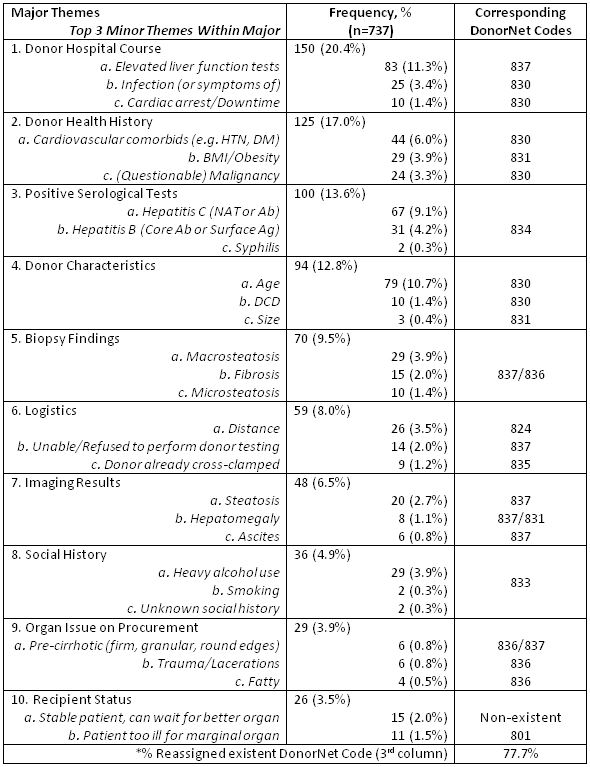“Donor Age or Quality” a Qualitative Analysis of Livers Declined for 830.
Abdominal Transplant, University of Rochester Medical Center, Rochester, NY
Meeting: 2017 American Transplant Congress
Abstract number: 504
Keywords: Donors, Graft acceptance, Liver, marginal
Session Information
Session Name: Concurrent Session: Economics and Outcomes in Organ Transplantation
Session Type: Concurrent Session
Date: Tuesday, May 2, 2017
Session Time: 4:30pm-6:00pm
 Presentation Time: 4:54pm-5:06pm
Presentation Time: 4:54pm-5:06pm
Location: E271a
Background: Efforts to improve organ utilization have been hindered by a lack of specificity on center's reasons for declining organs. One of the most frequently cited refusal codes in UNET “Donor Age or Quality” is particularly vague; our study seeks to more clearly define the reasoning behind its utilization.
Methods: All liver offers received by our program from 11/2014 to 12/2015 were included. On call coordinators prospectively documented specific refusal reasons at time of offer decision; surgeons later met to confirm by consensus. Qualitative analysis through open then axial coding of refusal comments was done by two study members; this structured process led to the development of ten major and 64 minor themes.
Results: Over 14 months, 48.3% (375/777) of livers offered to our center were declined using the 830 code for ≥1 candidate. A total of 737 minor themes were used to describe the surgeons' reasoning; declinations were multifactorial (≥2 minor themes) in 61.6% of donors.  The most prevalent major themes assigned were: hospital course, health history, and positive serologic tests; the top three minor themes: elevated LFTs, age, and HCV positivity.
The most prevalent major themes assigned were: hospital course, health history, and positive serologic tests; the top three minor themes: elevated LFTs, age, and HCV positivity. Employing guidance documentation from UNOS, minor themes were recoded revealing that 77.7%* initially described as 830 could have been assigned ≥1 relatively more specific DonorNet code.
Employing guidance documentation from UNOS, minor themes were recoded revealing that 77.7%* initially described as 830 could have been assigned ≥1 relatively more specific DonorNet code.
Conclusions: There are often multiple rationales for declining a single liver offer for donor age or quality; however, there seems to be frequent coding of 830 at our center- likely due to the code's ambiguity and ease of use. Our single center analysis, though warranting replication by other centers, suggests that UNOS should consider increasing the granularity and minimizing overlap of the organ discard codes.
CITATION INFORMATION: Dokus M, DeAngelis E, Ramaraju G, Tomiyama K, Huang J, Levstik M, Hernandez-Alejandro R, Orloff M, Kashyap R. “Donor Age or Quality” a Qualitative Analysis of Livers Declined for 830. Am J Transplant. 2017;17 (suppl 3).
To cite this abstract in AMA style:
Dokus M, DeAngelis E, Ramaraju G, Tomiyama K, Huang J, Levstik M, Hernandez-Alejandro R, Orloff M, Kashyap R. “Donor Age or Quality” a Qualitative Analysis of Livers Declined for 830. [abstract]. Am J Transplant. 2017; 17 (suppl 3). https://atcmeetingabstracts.com/abstract/donor-age-or-quality-a-qualitative-analysis-of-livers-declined-for-830/. Accessed February 18, 2026.« Back to 2017 American Transplant Congress
